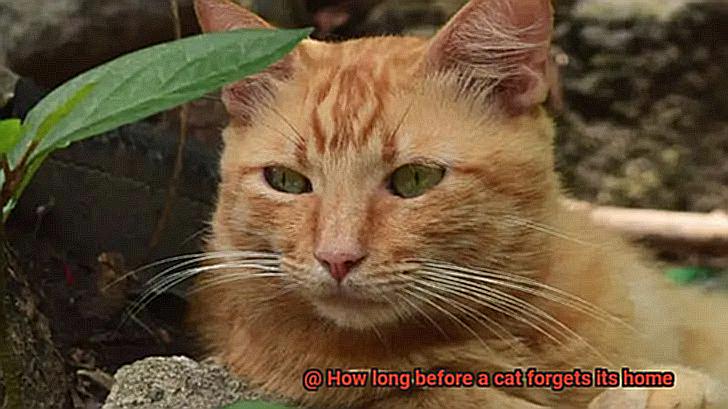Have you ever pondered about your feline friend’s memory? As pet owners, we all worry about our cats’ safety and wonder how long it takes for them to forget their homes if they escape or go missing. It’s crucial to know how far they can wander and still find their way back home.
Despite being known for their independence and aloofness, cats have an incredible ability to remember places and things. But the question remains: how long can they retain memories of their homes? According to studies, cats have an exceptional memory and can recall events up to ten years.
However, it’s not as simple as that. The memory of a cat depends on various factors such as age, breed, personality, and more. Some cats may have better memory power than others and can adapt quickly to new surroundings. Meanwhile, others may struggle to remember their way back home.
But don’t fret. There are ways you can help your feline friend remember their home and prevent them from wandering away. In this blog post, we’ll delve deeper into this intriguing topic of how long before a cat forgets its home. We’ll also provide some tips for pet owners on what they can do to ensure their furry friends stay safe and sound.
What Factors Determine How Long a Cat Takes to Forget Its Home?

The answer, however, is not straightforward, as several factors come into play.

One of the most important factors that determine how long a cat takes to forget its home is its age. Young kittens tend to be more adaptable and adjust more quickly to new surroundings than adult cats. This is because they have not yet formed strong attachments to their previous homes. Older cats, however, may take longer to adjust to their new environment and may experience confusion or disorientation when relocated.
In addition to age, the length of time spent in the previous home also affects a cat’s memory of its environment. A cat that has lived in the same home for years is likely to be more attached to it than a cat that has only lived there for a few months. The longer a cat has lived in a particular environment, the more familiar it becomes with its surroundings and the harder it can be for them to adapt to a new home.
Another factor that influences how quickly a cat adjusts to a new home is the level of socialization it has had. A well-socialized cat is typically more confident and adaptable than a cat that has had limited socialization. Socialization includes exposure to different environments, people, and other animals.
Lastly, the personality of the cat itself can affect how long it takes for them to forget their home. Some cats are naturally more curious and adventurous than others and may adjust more quickly to new environments. However, more cautious cats who prefer routine and familiarity may need more time and patience to adapt.
Age

For instance, younger cats, particularly those below six months, tend to forget their homes quickly. This is because they have not yet developed a deep attachment to their environment and can quickly adapt to new surroundings. Thus, if you’re bringing home a young kitten or cat, you may need to give them extra time and attention to help them adjust to their new habitat.
On the flip side, older cats, especially those above ten years old, may also experience memory loss and confusion due to cognitive decline. As a result, they may become disoriented and forgetful, making it challenging for them to remember their homes. In such cases, it’s crucial to be patient and provide your senior cat with comfortable surroundings that they’re familiar with.
It’s worth noting that even though cats may forget their homes, they still have an impeccable sense of smell that can help them find their way back. Cats rely heavily on scent to navigate their environment and can detect scents from up to several miles away. This means that even if your cat forgets its home, there’s still hope of finding them using their sense of smell.
Length of Time Away from Home
How long does it take for them to forget where they belong? As an expert in this field, I can tell you that the answer isn’t straightforward.
The length of time a cat can be away from home before forgetting it varies depending on several factors. Firstly, each cat has its own unique personality and attachment to its territory. While some cats may remember their home even after several months of being away, others may forget it after just a few weeks. Therefore, it’s crucial not to assume that your cat will always find its way back home.
Another factor that plays a vital role in how long a cat can remember its home is age. Older cats tend to have a stronger attachment to their territory and may remember it even after being away for an extended period. Younger cats, however, may forget their home more quickly, making it essential to keep a close eye on them when they’re outside.
The reason for the cat’s absence also affects how long they can remember their home. If the cat is taken away from home and placed in a new environment, they may forget their original home more quickly. However, if the cat is just exploring the neighborhood, they’re more likely to remember their way back home.
While cats have an excellent sense of direction and can find their way back home even after being gone for a few days, it’s essential to ensure that your feline friend has proper identification and is microchipped. This is especially crucial if your cat likes to roam around the neighborhood or if you’re planning on traveling with them. That way, even if they do forget their way back home, they can still be easily identified and returned to you.
Personality and Temperament
Just like us humans, cats have their unique personalities that influence how they behave in different situations.
For instance, independent cats are more likely to be adventurous and explore new areas, which could lead them to stray too far from their territory. This behavior may cause them to become lost or disoriented. However, independent cats may also be more adaptable to new environments, making it easier for them to adjust quickly if they are found or taken in by someone else.
On the other hand, cautious cats are less likely to wander away from home. However, they may become anxious or stressed when placed in an unfamiliar environment. This could make it more difficult for them to remember where their home is or adjust to a new living situation.
It’s crucial to note that every cat is unique and may react differently in these situations based on their individual personality and past experiences. While some cats may be deeply attached to their home and family, others may not be as attached and could potentially forget their home more quickly.
How Kittens Adapt Quickly to New Environments
Kittens are the ultimate masters of adaptation. Their ability to adjust to new environments is second to none. This is due to their developing brains that are more open to new experiences and learning. What’s more, kittens rely heavily on their mother for guidance in the first few weeks of life. As a result, they are accustomed to changes in their environment as they move around with her.
Introducing a kitten to a new home can be a challenge, but it’s essential to make sure they feel safe and comfortable in their new surroundings. Creating a designated area that includes food, water, litter box, and a cozy bed is crucial. It’s also important to ensure that the environment is free from hazards that could harm the kitten.
It may take a few days or even a week for a kitten to fully adapt to a new home, but they will eventually become comfortable and confident in their new environment. During this time, patience is key. Allowing the kitten to adjust at its own pace is crucial. To make the transition easier, providing plenty of toys, scratching posts, and hiding spots can help them settle in faster.

Socialization with humans and other animals is an integral part of a kitten’s development. Spending quality time playing with them and getting them used to being handled by people can help them learn social skills and adaptability. Introducing them to other animals in a controlled environment can also help them adapt to new situations.
How Older Cats May Take Longer to Adjust to New Environments
But when it comes to our senior cats, the transition to a new environment can be a bit more challenging. Older cats may take longer to adjust to new surroundings due to several reasons. Firstly, as cats age, they become more set in their ways and may be resistant to change. This is especially true if the cat has been living in the same environment for a long time. It’s essential to remember that moving to a new home can be stressful for any cat, but it can be particularly challenging for older cats who may feel more vulnerable and anxious in new environments.
Secondly, older cats may have health issues that make it difficult for them to adapt to new surroundings. For example, they may have arthritis or vision problems that make it harder for them to navigate unfamiliar spaces. As loving cat owners, we need to be patient and understanding during this adjustment period. We must give our furry friends plenty of time to explore their new surroundings at their own pace.
Moreover, older cats may also have a stronger attachment to their home and their owners. They may have formed strong bonds with their human family and feel more comfortable in familiar surroundings. Moving to a new home can feel like a significant loss for these cats, which can cause them stress and anxiety. It’s crucial to be mindful of this and provide extra love and care during this time.

To help your older cat adjust to a new home, there are several things you can do. First and foremost, be patient and understanding. Give your cat plenty of time to explore its new surroundings at its own pace. You can also try using pheromone sprays or diffusers to help your cat feel more relaxed and comfortable. Additionally, it’s important to maintain your cat’s routine as much as possible, including feeding times and litter box placement.
The Effects of Extended Time Away from Home on a Cat’s Memory
Our cats can recognize us by our faces and voices, remember specific routines, and even recall the layout of their homes. However, what happens when a cat is away from home for an extended period? Can they forget everything they once knew?
Studies suggest that cats can remember their homes and territories for up to three years or more. However, this memory can start to deteriorate if the cat is away from home for an extended period. The length of time it takes for a cat to forget its home depends on several factors, including the cat’s age, personality, and the length of time they spent away.
If your cat has been away from home for a short period, such as a few days or weeks, they are more likely to remember their homes than those who have been away for months or longer. While cats have excellent long-term memory skills, they also rely heavily on their short-term memory to navigate their surroundings. Therefore, being away from home for an extended period can lead to confusion and disorientation.
Moreover, studies have shown that stress or anxiety can affect a cat’s memory and increase the likelihood of forgetting their home. Stressful events such as moving to a new house, being separated from their owners, or experiencing a traumatic event may affect your cat’s memory.
As cat owners, we must take responsibility for our feline friends’ well-being and help them remember their homes. Providing them with a secure and familiar environment is crucial to achieving this goal. Keep their food and water bowls in the same spot, place familiar toys around the house, and maintain consistent routines as much as possible.
If you need to be away from home for an extended period, consider hiring a pet sitter or having a trusted friend or family member come by to check on your cat regularly. This will help maintain their routine and provide them with human interaction while you’re away.
The Importance of Patience and Support When Relocating a Cat
Relocating a cat requires patience and support to ensure a smooth transition. As feline behavior experts, we understand that cats thrive on routine and sudden changes can be overwhelming for them. Therefore, it’s essential to provide your cat with a safe and comfortable space in their new home where they can retreat when they need alone time. This could be a spare bedroom or any designated area that helps them feel secure.
To help your furry friend adjust to their new surroundings, it’s crucial to maintain their daily routine as much as possible. This includes feeding times, playtime, and litter box maintenance. Consistency is key when it comes to cats, and sticking to their routine can help them feel more at ease in their new home.
During this transition period, your cat may feel anxious and stressed. Therefore, giving them plenty of attention and affection is crucial. Spending extra quality time with your cat can help reassure them that everything is okay and make them feel more comfortable in their new environment.
Remember, relocating a cat takes time, and it’s essential to be patient and supportive throughout the process. With love and care, your cat will eventually feel right at home in their new surroundings.
JcO2b9qlx_0″ >
Conclusion
In conclusion, the memory of a cat is a complex and fascinating subject. While cats have an impressive memory that can recall events up to ten years, various factors play a role in how long they remember their home. Age, breed, personality, and more all impact a cat’s ability to adjust to new surroundings.
Young kittens tend to be more adaptable and adjust more quickly to new environments than adult cats. Meanwhile, older cats may take longer to acclimate and may experience confusion or disorientation when relocated.
The length of time a cat can be away from home before forgetting it varies depending on several factors. Each cat has its own unique personality and attachment to its territory. Some cats may remember their home even after several months of being away, while others may forget it after just a few weeks.
Studies suggest that cats can remember their homes for up to three years or more. However, this memory can start to deteriorate if the cat is away from home for an extended period. The length of time it takes for a cat to forget its home depends on several factors, including the cat’s age, personality, and the length of time they spent away.
As pet owners, we must take responsibility for our feline friends’ well-being and help them remember their homes by providing them with a secure and familiar environment. Maintaining their routine as much as possible is crucial in achieving this goal. Relocating a cat requires patience and support to ensure a smooth transition. With love and care, your furry friend will eventually feel right at home in their new surroundings.
In short, while there is no definitive answer as to how long before a cat forgets its home, we can do our part in helping them remember by providing comfort and stability during times of change.

